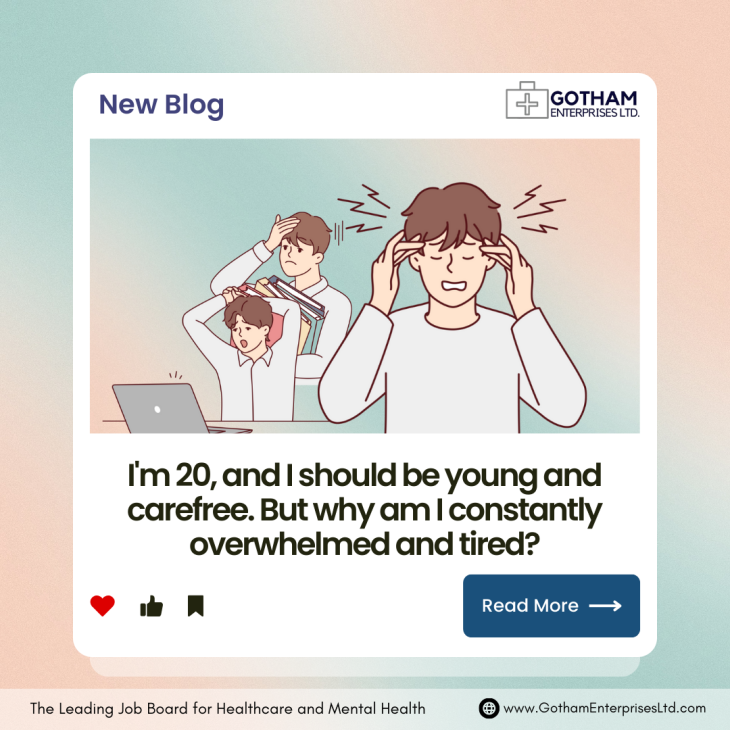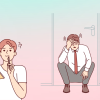Recent Posts
- I broke up with my partner, but now I am having doubts. Did I do it out of the right reasons or was I just being fearful?
- My Quick Temper Pushes People Away. What Do I Do To Manage My Anger?
- How does noise affect my mental health?
- I want to be a better problem solver. What is a step by step approach?
- Escapism. When is it healthy? When is it damaging?
Most Popular
I'm 20 and I should be young and carefree. But why am I constantly overwhelmed and tired?

I'm 20, and I should be young and carefree. But why am I constantly overwhelmed and tired?
That famous pop song about being 22 and having perfect nights with friends seems to be the anthem of people in their 20s, but for those who grew up in the time of the Covid-19 pandemic, being so worry-free that they can eat breakfast in the middle of the night might not exist.
Instead, a 2023 survey from the American Psychological Association shows that young people are feeling overwhelmed, tired- even scared of what the future holds. Making choices at such an uncertain time and being scared that they might regret these choices and feeling that they are lagging behind their peers are just a few of the things that weigh young people down.
According to this nationwide survey, people of all ages are experiencing the traumatic effects of the recent pandemic. The trauma is so widespread that overall, there has been a significant increase in reported mental health issues compared to pre-pandemic times.
Common reasons leading to stress in young people:
-
Workplace changes
-
School system changes
-
Cultural issues
-
Diagnosis with a mental health condition or a physical illness
Stress can manifest itself in different ways such as:
-
Alteration in one’s mental health
-
Being more reactive to life’s common stressors
-
Change in one’s outlook in life
-
Negative impact on one’s body especially on the immune system
Mentally, you might notice these changes:
-
Feeling of being tired or low in energy
-
Feeling scared to the point of being overwhelmed to make decisions
-
Feeling the difficulty of thinking about or making plans for the future
What are some common mistakes that young people make in dealing with stress?
-
Making light of one’s stress
A commonly held belief among young people is that to be empathetic is to think about the reality that other people have worse problems, and being thankful about what we have instead of expressing our “negative” feelings.
-
Believing that therapy is only for those with “serious” problems.
This is related to the first one, but it also sheds light to the fact that young people find it hard to ask for help. Asking for help may be viewed as weakness and is rather looked down upon.
-
Carrying the stress alone.
The way we were raised may have given us the impression that we have to pull our own weight alone- after all, we are adults already. We don’t want to give the burden to others, so it is better to deal with our stressors within ourselves.
-
Not making time to know one’s feelings.
Before anyone can be of help, our ability to recognize our own struggles is a valuable skill to have. Not taking the time to slow down and to ask one’s self probing questions like, “How am I?” , “How am I feeling now?” , “What led me to do that, say that or decide that?” makes feelings blurrier and heavier.
So what can young people do to ease their stress and enter into one of the most fun seasons of their lives?
-
Recognize the hurt. The repercussions of the pandemic are still present, so the first step is to be aware that we are still dealing with them until now. Just like wounds that have not yet healed, we give it time and the right environment to do so.
-
Acquire stress-relieving skills that are aimed for long-term stressors. Equipping ourselves with coping skills may spell the difference between having the ability to enjoy life as it is day by day and living life as if we were in a recurring nightmare. One useful skill is knowing how to tell one’s own feelings. Tools like the Feelings Wheel can assist us in deciphering the complex feelings in a given situation. Being able to name our feelings is the first step to dealing with them.
-
Talk to friends or a therapist. Some topics may be uncomfortable to talk about, just like financial situations or conflicts within close relationships, but having someone to listen to you while you process your feelings works to untangle complicated emotions and deflate some of the built-up pressures.
Your 20s can be the best time of your life- or it won’t be. But it also means it can be the time when you feel most empowered to take control of your stress, feelings and decisions. After all, the more power you hold over yourself, the best you would feel, regardless of age.







Comments